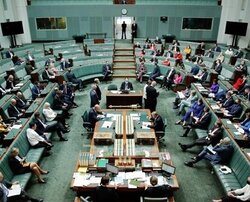We need women to get married! And have families – Angela Priestley* jokes. She asks what else could possibly be done to get them to vote for parties on the right?
 Young women, what are you thinking? You’re ruining everything, especially the good times, power and election prospects of right-wing parties.
Young women, what are you thinking? You’re ruining everything, especially the good times, power and election prospects of right-wing parties.
As for unmarried women, you’re ever worse – representing a key demographic that rejected Republican candidates in the US midterms and got in the way of the much anticipated red wave sweeping across the US Senate.
And what about young women who are also unmarried? Well, you’re just a lost cause.
Yes, various segments of women are being blamed for the demise of right-wing party votes.
Not just in the United States, but also here in Australia.
We need single women to get married, cried Fox News commentator Jesse Watters, responding to the higher than expected vote towards Democrats during last week’s midterms.
“Once women get married, they vote Republican,” he said.
“Single women and voters under 40 have been captured by Democrats.”
“We need these ladies to get married.
“It’s time to fall in line, and settle down.
“Guys, go and put a ring on it,” the commentator said.
What a shame single ladies of the US, Jesse Watters is already taken.
Last week in The Australian, Nick Cater shares his view on “single young females” being the “biggest threat to parties on the right”.
In the actually published piece, Cater starts by declaring that US President Joe Biden should be grateful to single women – as they are one of the fastest growing voter blocks in the US, as they are here in Australia also.
In Australia, Cater is concerned about the rise of single 20 and 30-somethings as being “one of the most disturbing trends to emerge from last year’s census”, with women under 35 now more likely to be single than not, for the first time.
“Young women may be more ideologically drawn to the Left, than those older and wiser to the ways of the world,” Cater wrote.
He then goes on to discuss how life for “single woman isn’t as liberating as it appears in the average Hollywood rom-com.”
Perhaps he knows something better about life for married women, other than stats that find women married to men do more housework than women who are not.
He could do worse than to consider the suspected link between Australia’s increasing divorce rate and the uneven division of unpaid labour between couples.
In acknowledging that life for “single women” isn’t all Hollywood and roses, you might consider some of the day-to-day challenges single mothers face in getting food on the table — with a third of sole-parent families headed up by women living in poverty.
You might note the rise of older homeless women in Australia, and reflect on more policies that can support women’s overall safety — whether they are single, in relationships, or simply hoping to feel safe walking home at night.
But as Cater states, the real issue is that single women “have a vested interest in state intervention” and while a generation ago they could have relied on a “breadwinner to support them”, “today that breadwinner is the government to all intents and purposes, an ever-reliable partner with deep pockets to top up their meager income.”
Labor, he says, has abandoned the worker class for the “welfare and professional classes.”
Cater then goes on to share some ideas for addressing the rising single women’s problem, rather than ideas that could actually appeal to single women.
He suggests that removing various bureaucratic barriers for supporting more housing construction will help, somehow.
He suggests superannuation changes – like lowering payment requirements for under 35s and increasing incentives for over 55s, will also help, somehow.
He wants more incentives for young adults to work earlier and learn a “useful trade”.
More home ownership, Cater believes, is key to the Coalition winning more votes.
Not sure how the above is going to encourage women to go and get married.
Nor how it will support some of those in the “welfare and professional classes” to get in and swing their support back to parties on the right.
Meanwhile, single women in Australia are actually on the increase when it comes to applying for home loans, with single women equalling single men when it came to who was buying property in 2021, according to ME Bank.
In the US, 72 per cent of women aged 18 to 29 voted Democrat in last week’s midterms.
Was it because they are unmarried, or don’t own a home? Or was there something else that was particularly frustrating them and causing them to pick anything but the Republicans?
One guess could be that it had something to do with a US Supreme Court that took away their constitutional right to have autonomy over their own bodies.
Perhaps you could ask some young women in Australia, just what they’re rejecting and why, and consider policies and initiatives that support what you’re learning.
You could also try speaking with some single mothers, and learning more about their challenges and what’s going on in their lives, rather than dismissing them as being only interested in welfare.
There could also be something in those figures finding that first home ownership is on the rise among single women.
Parties on the right need to try and appeal to young women and single women, rather than attempt to “bring them into line”.
*Angela Priestley is the Founding Editor of Women’s Agenda, and now heads up the publication’s parent company Agenda Media.
This article first appeared at womensagenda.com.au.











